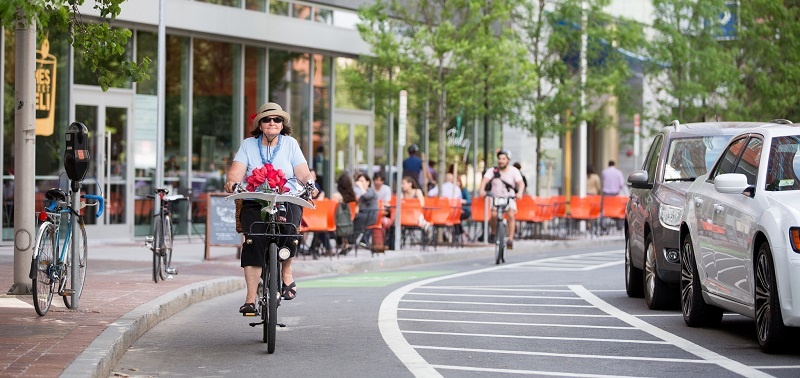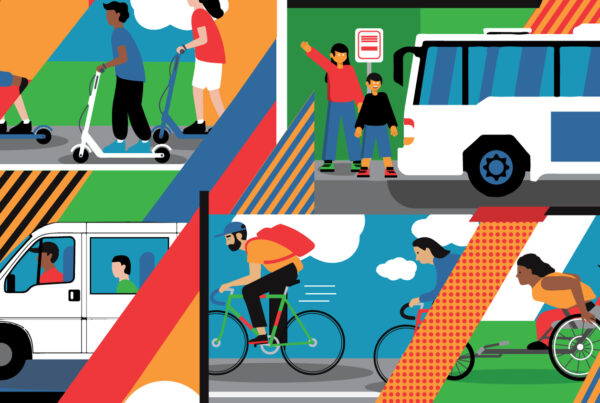Shared mobility has the potential to deliver transformative benefits for cities and regions, from reducing single-occupancy vehicle trips to lessening household transportation costs and opening up access to jobs and opportunity.
However, these benefits are only truly possible if new and emerging modes of transportation work for everyone. Proactive leadership is needed, now more than ever, to help ensure the public good and support the creation of a robust network of equitable, environmentally sound transportation choices.
That’s why the Shared-Use Mobility Center is proud to have worked with a consortium of transportation experts to create a set of Shared Mobility Principles for Livable Cities designed to help guide urban decision-makers and stakeholders toward the best outcomes for all.
SUMC joins several other leading city and transport NGOs to stand behind these principles, including Zipcar Co-Founder Robin Chase, the C40 Cities Climate Leadership Group, ICLEI – Local Governments for Sustainability, Institute for Transportation and Development Policy, Natural Resources Defense Council, Partnership on Sustainable Low Carbon Transport (SLoCaT), Rocky Mountain Institute, and WRI Ross Center for Sustainable Cities. The principles are as follows:
The Shared Mobility Principles for Livable Cities
- We plan our cities and their mobility together. The way our cities are built determines mobility needs and how they can be met. Development, urban design and public spaces, building and zoning regulations, parking requirements, and other land use policies shall incentivize compact, accessible, livable and sustainable cities.
- We prioritize people over vehicles. The mobility of people and not vehicles shall be in the center of transportation planning and decision-making. Cities shall prioritize walking, cycling, public transport and other efficient shared mobility, as well as their interconnectivity. Cities shall discourage the use of cars, single-passenger taxis and other oversized vehicles transporting one person.
- We support the shared and efficient use of vehicles, lanes, curbs and land. Transportation and land use planning and policies should minimize the street and parking space used per person and maximize the use of each vehicle. We discourage overbuilding and oversized vehicles and infrastructure, as well as the oversupply of parking.
- We engage with stakeholders. Residents, workers, businesses and other stakeholders may feel direct impacts on their lives, their investments and their economic livelihoods by the unfolding transition to shared, zero-emission and ultimately autonomous vehicles. We commit to actively engage these groups in the decision-making process and support them as we move through this transition.
- We promote equity. Physical, digital and financial access to shared transport services are valuable public goods and need thoughtful design to ensure use is possible and affordable by all ages, genders, incomes and abilities.
- We lead the transition towards a zero-emission future and renewable energy. Public transportation and shared-use fleets will accelerate the transition to zero-emission vehicles. Electric vehicles shall ultimately be powered by renewable energy to maximize climate and air quality benefits.
- We support fair user fees across all modes. Every vehicle and mode should pay their fair share for road use, congestion, pollution and use of curb space. The fair share shall take the operating, maintenance and social costs into account.
- We aim for public benefits via open data. The data infrastructure underpinning shared transport services must enable interoperability, competition and innovation, while ensuring privacy, security and accountability.
- We work towards integration and seamless connectivity. All transportation services should be integrated and thoughtfully planned across operators, geographies and complementary modes. Seamless trips should be facilitated via physical connections, interoperable payments and combined information. Every opportunity should be taken to enhance connectivity of people and vehicles to wireless networks.
- We support that autonomous vehicles (AVs) in dense urban areas should be operated only in shared fleets. Due to the transformational potential of the autonomous vehicle technology, it is critical that all AVs are part of shared fleets, well-regulated and zero emission. Shared fleets can provide more affordable access to all, maximize public safety and emissions benefits, ensure that maintenance and software upgrades are managed by professionals, and actualize the promise of reductions in vehicles, parking and congestion, in line with broader policy trends to reduce the use of personal cars in dense urban areas.
More information is available here. The Shared Mobility Principles for Livable Cities were officially launched at the EcoMobility World Festival in October 2017 in Kaohsiung, Taiwan. To keep up on the latest news in shared mobility, be sure to sign up for SUMC’s weekly newsletter.
Image credit: Adam Coppola Photography


